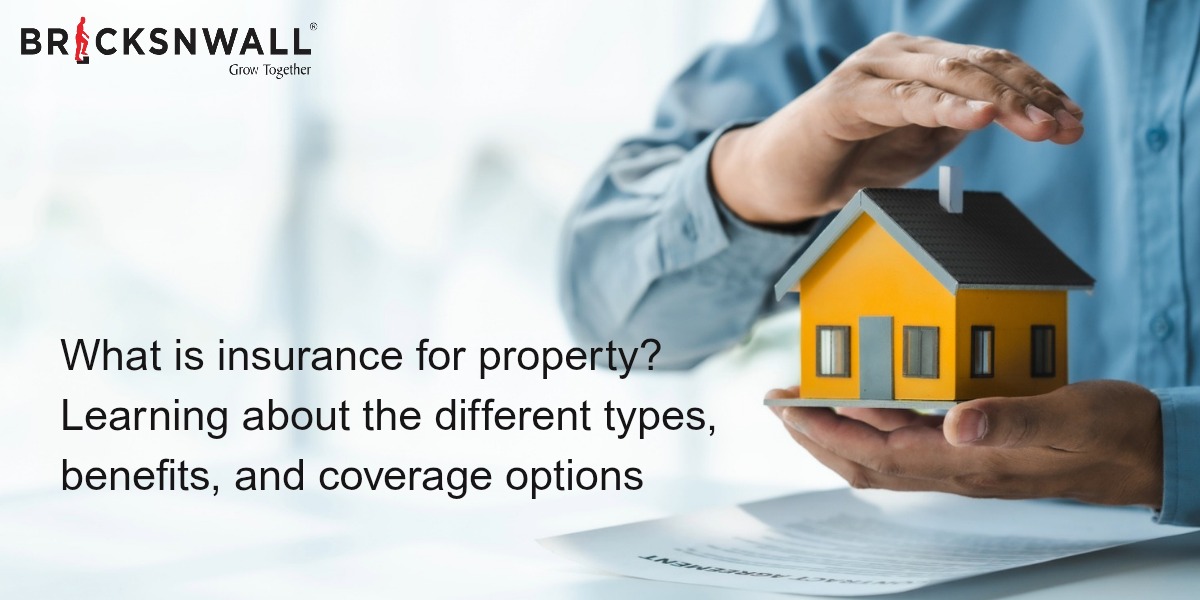What is insurance for property? Learning about the different types, benefits, and coverage options
Bricksnwall Trusted Experts

What is Insurance for Property?
If you want to buy a home or already own one, it's
important to know what property insurance is and how it protects your things.
Property insurance protects your important things, including your home,
business premises, and other personal items, against unexpected threats. It
helps you deal with the harm or loss caused by bad things like theft, fire,
natural catastrophes, or vandalism. In a technical sense, it is a group of
rules that prevent the owners or tenants from being held liable or losing their
property. They will pay you back if your property is damaged by fire, water, or
any natural disaster. They also cover liability and theft of your things.
Compensation can include the property and its contents, as well as anyone else who is hurt or affected while on the property, other than the owner or renter. Policies are typically made to fit certain types of real estate and their demands. There is an insurance plan for your property, whether you own it, rent it, or invest in it. It protects your hard-earned savings from any risks, so you can sleep soundly knowing that your money is safe.
Important Kinds of Property Insurance
Property insurance comes in a wide range of possibilities because people own a vast range of things, from homes to personal items. Each option is designed to cover a different type of asset. Some protect your home or business, while others are made to satisfy special demands. Knowing what property insurance means and what your alternatives are will help you make smart choices to protect your most valuable things. Let's take a look at the basic types of property insurance and how they meet different insurance needs.
Insurance for Homeowners
This is one of the best things you can do to keep
your home and everything in it safe. It keeps you from having to deal with the
high costs of repairs or replacements if something happens, such vandalism,
damage, or a calamity. Homeowners insurance gives you the basic protection you
need to rebuild and get back on your feet. Getting the correct policy can help
protect the memories and belongings in your house from the unexpected things
that happen in life. This kind of insurance usually covers more than just the
construction of your home:
Things like clothes, furniture, and electronics are your own belongings.
Liability coverage: If someone gets hurt on your property or if you damage someone else's property.
Extra living expenses:
For temporary accommodation if you have to move because of damage or a calamity.
Insurance for Renters
This is a clever approach for people who rent a
home to protect their things and get liability coverage even if they don't own
it. The landlord's or owner's property insurance covers the building, but
renters insurance protects your personal belongings, such as clothes,
electronics, and furniture, from damage. It also protects the owner from being
sued if someone gets hurt on the property. Renters insurance covers a lot of
important things, such as:
Personal property coverage protects your things from theft, fire, and other types of harm.
Liability protection: If someone is hurt in your rented space because of an accident, it pays for their medical bills or legal fees.
Extra living costs: This covers the cost of interim housing if the rented apartment is no longer livable because of the damage.
Insurance for Commercial Property
A commercial property insurance coverage protects
the things that a firm needs to run. It is a type of property insurance,
although it is more focused on protecting a business's assets than a person's.
It is made for businesses and covers things like office buildings, equipment,
inventory, and even lost income due to property damage or disruption. The right
policy helps businesses get back on their feet fast and cut down on downtime
because commercial properties are a big investment. It usually gives you the
following:
Building coverage pays for damage to the walls, roof, and foundation of the building.
Business property: This covers the damaged furniture, equipment, inventory, and other items that are needed for the business to run.
Liability protection: Covers incidents that happen on the property and keeps the firm from having to pay for legal and medical bills.
Business interruption: Covers lost income from operations that were stopped because of the bad incident.
Insurance for Floods
Flood insurance is a sort of coverage that protects
your property from damage caused by floods. This type of damage is usually not
covered by ordinary homeowners or renters insurance. Heavy rain, storms,
hurricanes, or even melting snow can cause floods that can seriously harm the
buildings on the property and your things. Flood insurance protects you when
something unexpected happens, especially in places that are more likely to
flood. It does the following:
Structural coverage:
This type of insurance covers the actual parts of your home or building, like
the roof, walls, and foundation.
Personal property coverage pays for damage to things like electronics, furniture, and clothes that are damaged by floods.
Debris removal: Covers the costs of getting rid of flood debris.
Insurance for Earthquakes
Earthquake insurance is a must if you live in an
area that has a lot of earthquakes. It will help you be ready for anything.
Earthquakes can damage structures, crack walls, shift foundations, or
completely destroy buildings. Because of this, residents in areas that are
likely to have earthquakes should think about getting this extra coverage. Most
regular homeowners insurance policies don't cover this kind of damage, but
earthquake insurance does. It gives you the following:
Structural coverage pays for damage to the walls, foundation, and other important parts of the house that were caused by an earthquake.
Personal property coverage pays for the loss or damage to your personal possessions in your house, such your electronics and furnishings.
Extra living expenses: This pays for temporary
housing costs if your home is too damaged to live in after an earthquake.
Benefits of Property Insurance
Think about how nice it would be to know that
someone else is taking care of your possessions and that you won't have to pay
for the whole thing if something goes wrong. Property insurance is a financial
shield that lets you relax even when life throws you curveballs. Some of the
main benefits of property insurance are:
It pays for the repairs or replacement of your property when it is destroyed by bad weather.
The coverage for your possessions and property helps you get back to normal after a tragedy.
Liability protection keeps you from having to pay for medical or legal bills if someone is hurt on your property.
You may relax knowing that you have financial options that will help you get back on your feet quickly after an unforeseen catastrophe.
Different Types of Coverage in Property Insurance
Picking the correct coverage can make a big difference in how quickly you can get back on your feet after an unforeseen occurrence. Depending on the type of policy you have, the value of your home and valuables, as well as the cost of repairs, may be different. So, it's necessary to know about the many types of coverage. Each one has its own set of features that are tailored to meet your demands and make sure you're safe. Let's look at the three most prevalent choices: Replacement Cost, Actual Cash Value, and Extended Replacement Cost.
The Actual Cash Value (ACV)
It offers a cheaper way to protect your property, but there's a catch. Actual cash value takes into account depreciation, thus it doesn't pay the full replacement cost. This means that after taking into account wear and tear, you will get the current worth of your damaged property. This choice can save you money on premium choices, but the reimbursement might not be enough to fully replace what you lost, especially if the items were older and had lost a lot of value.
Common Perils Covered in Property Insurance
Property insurance is meant to keep your home,
things, and business safe from a wide range of unexpected problems and dangers.
The most prevalent risks that are usually covered are:
Fire: This covers damage to buildings and personal property caused by flames from abrupt fires.
Theft: Protection against losing things because of theft, like stolen goods and property.
Vandalism: Pays for damage done by bad behavior, including smashed windows, graffiti, or destroying property.
Natural Disasters: Depending on the policy, this covers damage from storms, hurricanes, earthquakes, and other natural disasters.







